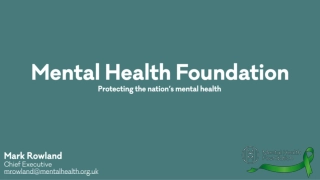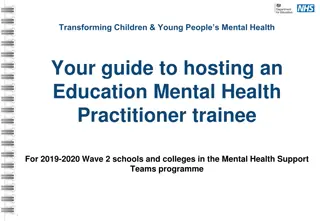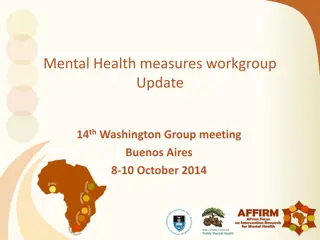Supporting Mental Health: Practical Tips and Signposting
Learn to recognize early signs of declining mental health and how to have meaningful conversations about mental well-being. Discover practical tips for providing support, including spotting warning signs and initiating important discussions. Be prepared to address mental health crises and offer assistance to those in need.
Download Presentation

Please find below an Image/Link to download the presentation.
The content on the website is provided AS IS for your information and personal use only. It may not be sold, licensed, or shared on other websites without obtaining consent from the author. Download presentation by click this link. If you encounter any issues during the download, it is possible that the publisher has removed the file from their server.
E N D
Presentation Transcript
Quilter Basic B rand Guidelines Our b rand a ss ets 1 A practical guide for supporting mental health Practical tips and signposting support
Looking out for the early signs We all have mental health. Sometimes we re in a good place where we feel resilient and we can cope with our world day to day. Sometimes this feels more difficult. We can think about our mental health like a bucket that fills up with the stresses and challenges we face day to day. Little things, and big things, fill it up. Our mental health bucket can also be emptied - for example, by getting a good nights sleep, or engaging with things that support us. If our bucket gets full or overflows then we can feel anxious and overwhelmed. Our mental health dips. It s important to look out for early warning signs that our own, or someone else s, mental health is dipping. These will vary from person to person. The key is to notice when you, or someone you know, is not themselves . 2
How to spot signs of mental health dipping Here are some examples, including feelings, thoughts or behaviours that may change and be out of character Changes in thinking, feeling and behaviour, such as Physical signs, such as Not getting things done, missing deadlines or forgetting tasks. constant tiredness Seeming erratic, or unpredictable sickness absence Irritability, aggression, tearfulness, arguments or conflicts with others being run down and frequent minor illnesses Being withdrawn and not participating in conversations or out-of-work activities as usual; or being louder and more exuberant than usual headaches difficulty sleeping Increased consumption of caffeine, alcohol, cigarettes and/or sedatives weight loss or gain Inability to concentrate, indecision or difficulty remembering things lack of care over appearance Loss of confidence gastrointestinal disorders Unplanned absences. rashes/eczema Increased errors and/or accidents Taking on too much work, or working too many hours Being very rigid or fixed about things 3
How to have a conversation about mental health If you spot signs that someone is struggling emotionally, or where you re concerned for someone s mental health, start a conversation by following the CARE steps: Calmly approach Encourage the person to talk. Reassure that you re listening. Actively listen, without judgement Listening with empathy often makes the biggest difference. You are not there to fix or give answers. Recommend immediate help if needed If you re worried for their safety call 999 for an ambulance. Encourage to seek professional help or support Use the information in this guide to signpost people to options for support. 4
In a mental health crisis Advice from the Samaritans Simple actions can help you be there for someone who is experiencing suicidal thoughts or recovering from an attempt to take their own life. It s also important to know when to seek professional support, and when to step back to look after yourself. Evidence shows asking someone if they're suicidal can protect them. By asking someone directly about suicide, you give them permission to tell you how they feel, and let them know that they are not a burden. People who have felt suicidal will often say what a huge relief it was to be able to talk about what they were experiencing. If someone does let you know that they are having suicidal thoughts, always take them seriously. You don't have to be able to solve their problems. But, if you feel you can, offer support and encourage them to talk about how they're feeling For further tips visit: Supporting someone with suicidal thoughts | Samaritans 5
Signposting support Encourage anyone who s struggling to seek support. In an Access NHS talking therapies (see online for local details) emergency, call 999 and talk until they re safe Talk to their trusted friends or family Call their GP or current therapist 6
Signposting helplines Often people on helplines have their own experiences of mental health issues. They re there to listen rather than provide counselling or therapy. You can talk about anything and they re all confidential. C.A.L.M. (Campaign Against Living Miserably): Telephone and webchat are both available 5pm midnight every day. Anxiety UK: Support if you have been diagnosed with an anxiety condition. Phone: 03444 775 774 (Monday to Friday, 9.30am to 5.30pm) Website: www.anxietyuk.org.uk Telephone (outside London): 0800 58 58 58 Telephone (London): 0808 802 58 58 Webchat: www.thecalmzone.net/help/webchat/ Website: www.thecalmzone.net Samaritans:If you need someone to talk to, we listen. We won't judge or tell you what to do. Silverline: For people over 55 Telephone: 116 123 (24/7, every day) Email: jo@samaritans.org Website: www.samaritans.org Telephone: 0800 4 70 80 90 (24/7, every day) Website: www.thesilverline.org.uk Sane Line: For anyone affected by mental illness, including families, friends and carers. The Mix: For people under 25 Telephone: 0808 808 4994 (4-11pm, 7 days a week) E-mail: through www.themix.org.uk Crisis text message service: Text THEMIX to 85258 (24/7, every day) Webchat: through the website. (4pm - 11pm, 7 days a week) Telephone: 0300 304 7000 (4:30pm 10:30pm every day) Textcare: www.sane.org.uk/what_we_do/support/textcare Support Forum: www.sane.org.uk/what_we_do/support/supportforum Website: www.sane.org.uk Mood Swings: For anyone affected by a mood disorder, including friends, families and carers Support Line: Emotional support to anyone on any issue. Telephone: 01708 765200 (hours vary, ring for details) E-mail: info@supportline.org.uk Website: www.supportline.org.uk Telephone: 0161 832 37 36 (10am-4pm Monday to Friday) E-mail: info@moodswings.org.uk Website: www.moodswings.org.uk























